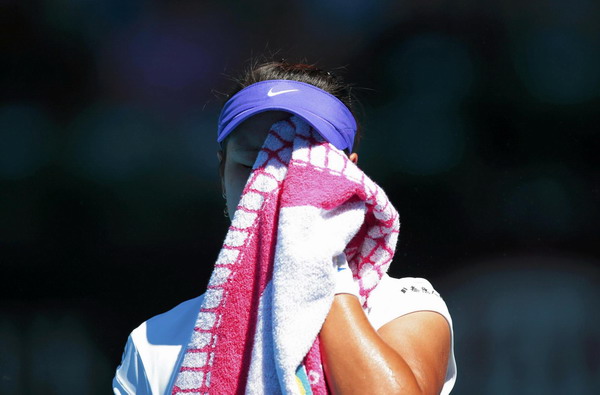Li Na's hometown denies statue removal
 0 Comment(s)
0 Comment(s) Print
Print E-mail Xinhua, March 21, 2012
E-mail Xinhua, March 21, 2012
 |
|
Li Na of China wipes herself with a towel during her women's singles match against Kim Clijsters of Belgium at the Australian Open tennis tournament in Melbourne January 22, 2012. [Photo/Agencies] |
"It is a groundless rumor and the statue will stay there," said Hu Zhijun, administrator of the Hankou Bund Park, a popular tourist destination in Wuhan, central China's Hubei province.
Wuhan's version of Walk of Fame is part of the park on the northern bank of the Yangtze River and consists of 13 statues of world and Olympic champions born in the province.
Li attended the unveiling of the statue of herself last year, after becoming the first Asian tennis player to win a singles Grand Slam title at the French Open.
But a posting forwarded thousands of times on Sina Weibo, China's Twitter-like social networking site, said Wuhan had decided to remove the statue due to the "harmful effect" of Li's uninhibited comment.
"I always believe if you lie one time you have to use 10 times to recover that one lie. So I didn't want to do that," Li said last week after beating compatriot Zheng Jie at the Indian Wells tournament in California.
"I know if I say real things many people will hate me. But it doesn't matter. I'm happy."
She added that "I'm only a tennis athlete. I'm not here for the country. I just play my tennis. I am just doing my job to try the best."
Among Chinese athletes, Li is a rare personality, who speaks fluent English and appears comfortable in front of the international press.
She is also well known for seldom mincing her words. She once complained to reporters about her husband's loud snore before major matches and asked the chair umpire to tell excited fans in the stands to keep quiet.
But what she said this time sparked a wave of criticism and controversy back in China. Some say that she lacks love for her country and she couldn't have made achievements without training on the provincial and national teams in the past. Others argue that "playing tennis is Li Na's job and we all do our jobs for ourselves".
Li, who joined the national team in 1999, quit the tightly-controlled state-run training system and started to train on her own in late 2008. Chinese media dubbed the move - a policy experiment for Chinese tennis players - "Fly Alone". Li said her main focus right now is on the Women's Tennis Association tour.
Chinese tennis chief Sun Jinfang said, "That's just Li Na. She plays for herself because she makes a living by competing in international matches. But as a Chinese, she also represents China, of course."
Li is not the first Chinese athlete to come under controversy for virtually telling it like it is.
Chinese speed skater Zhou Yang, from a low-income family in north China, said she would make her parents live a better life, after winning a gold medal at the 2010 Winter Olympics. She was reportedly rebuked by officials from China's General Administration of Sport for failing to thank the country first.
"Why do athletes have to say they play for the country and thank the country first," said Zhou Yunqing, sociologist with Wuhan University. "Some people need to change their way of thinking."






Go to Forum >>0 Comment(s)